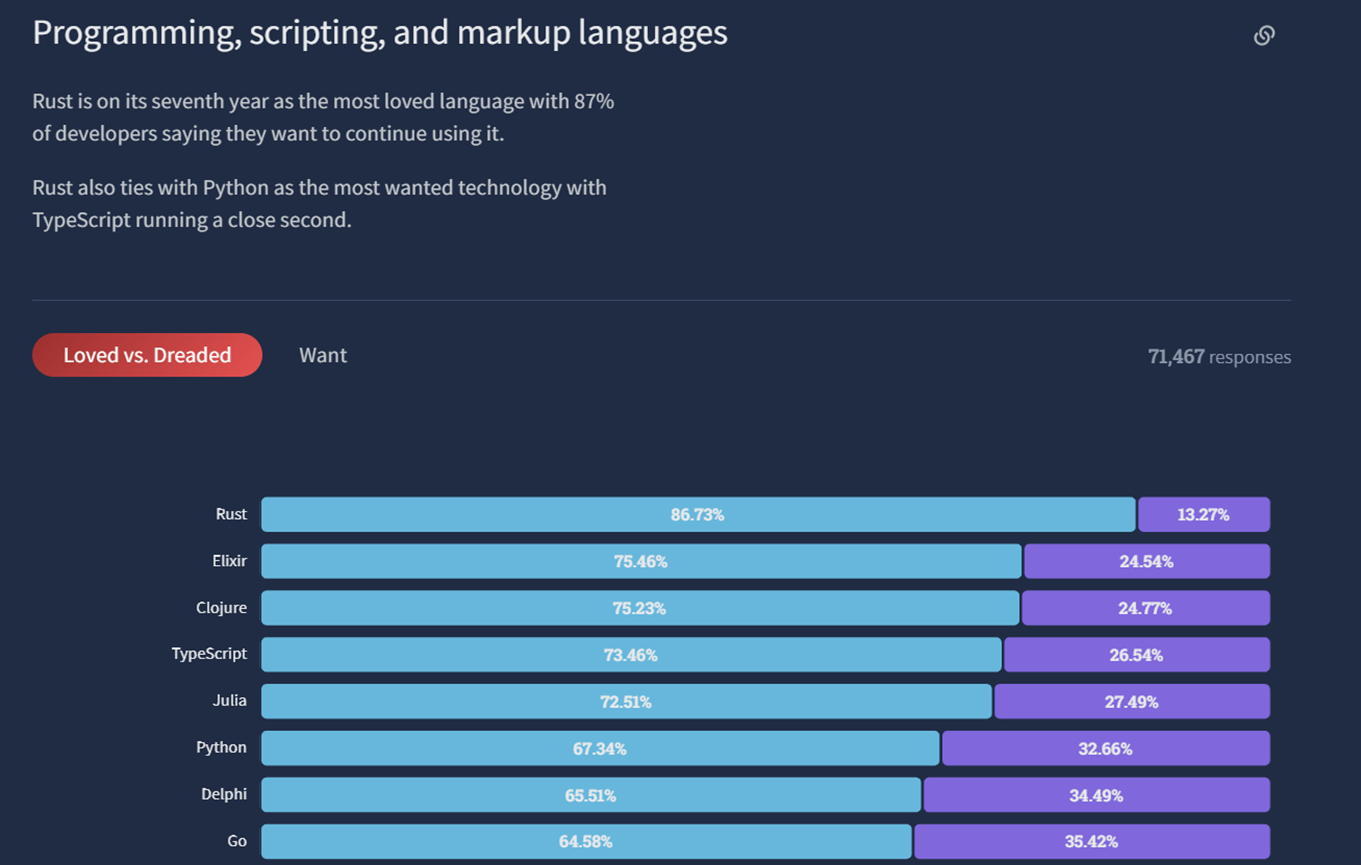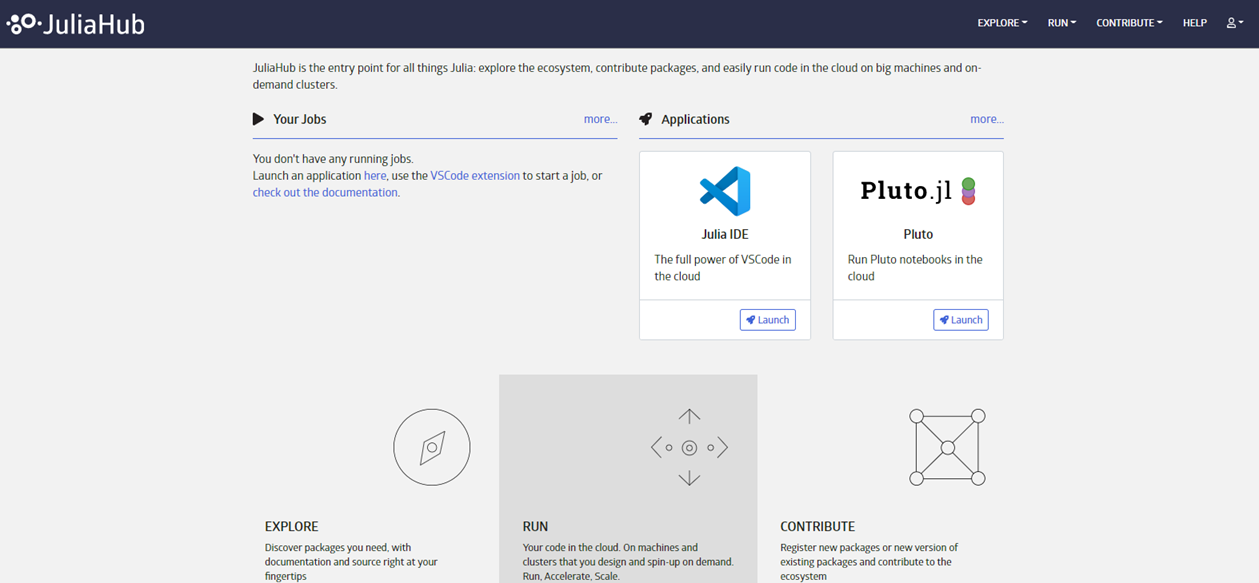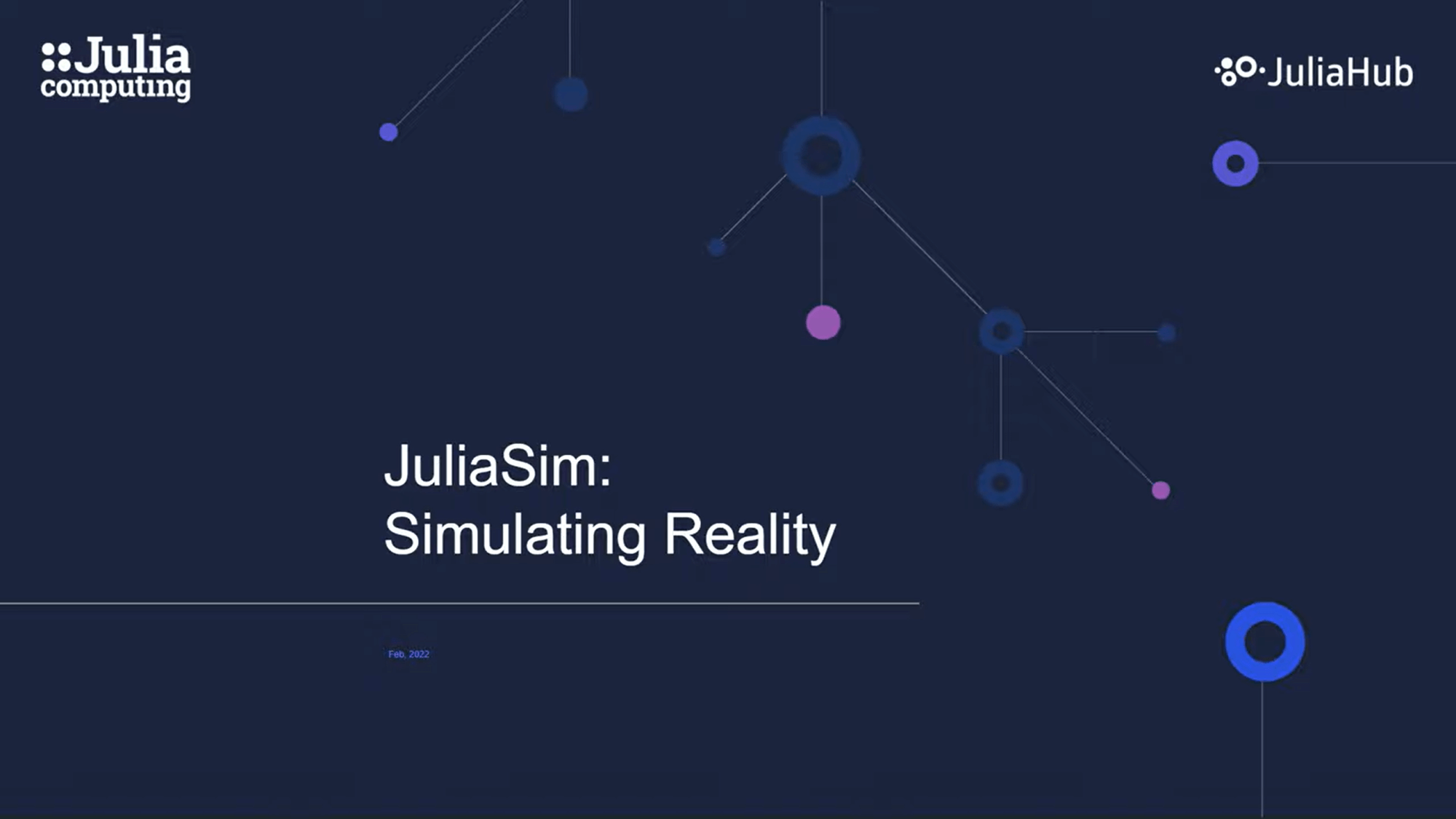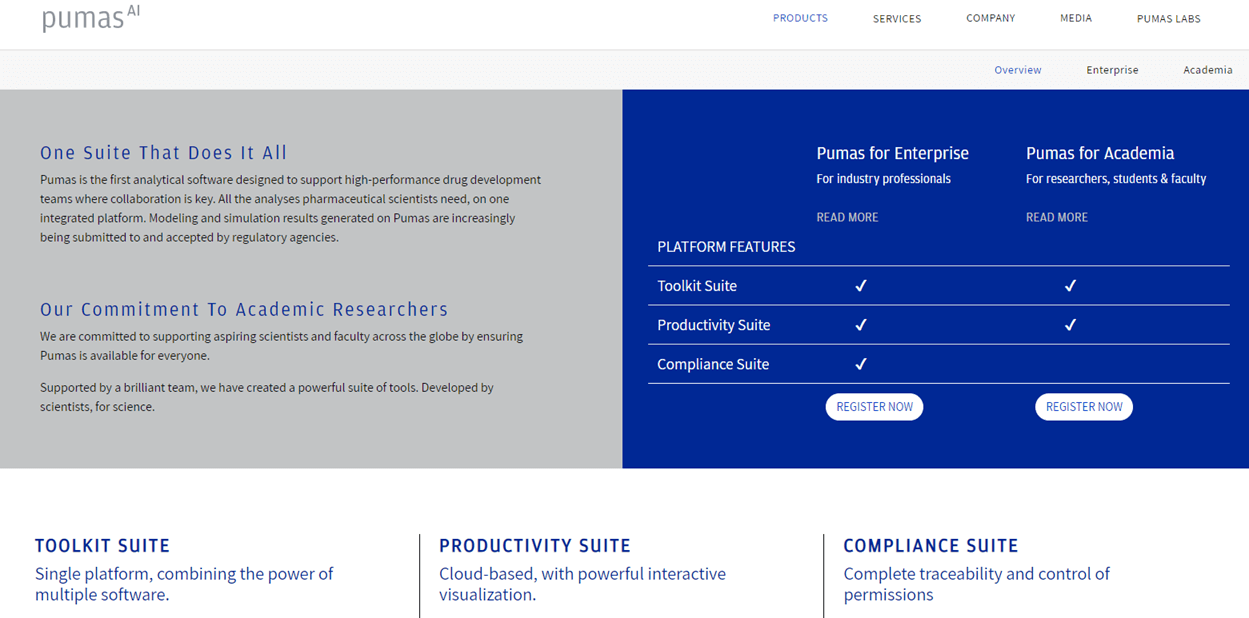Newsletter July 2022 - Julia User & Developer Survey and Julia T-Shirt Contest - Respond Today!
Julia User & Developer Survey and Julia T-Shirt Contest: The 2022 Julia User & Developer Survey is open now - please respond today! The survey is available in English, Japanese and Spanish. Click here to respond. Results will be presented at JuliaCon. Respondents are invited to enter a contest to win a free Julia t-shirt.
Julia Ranks Top 5 Most Loved Programming Language in Stack Overflow Developer Survey: For the second year in a row, Julia ranks #5 on the list of most loved programming languages in the Stack Overflow Developer Survey, ahead of Python. The full list is available here.
 JuliaCon 2022: JuliaCon 2022 will be free and online July 27-29.
JuliaCon 2022: JuliaCon 2022 will be free and online July 27-29.
-
Register for Free Today! Registration is required. There is no cost to register but donations are strongly encouraged for those who are able and want to support JuliaCon and the Julia community. Donations support initiatives such as Julia Community Prizes, Julia Summer of Code, Diversity & Inclusion, Infrastructure and more.
-
Julia Community Prizes: The 5th annual Julia Community Prizes will be awarded during JuliaCon. You are encouraged to nominate groups or members of the Julia community for their contributions to the Julia language, community and/or ecosystem.
 Dyad (Formerly JuliaSim) Webinar from Julia Computing: Dyad (Formerly JuliaSim) is a next-generation cloud-based simulation platform from Julia Computing. It combines the latest techniques in scientific machine learning (SciML) with equation-based digital twin modeling and simulation. Dyad’s modern machine learning-based techniques accelerate simulation by up to 500x, changing the paradigm of what is possible with computational design. Join us for this introduction to Dyad (Formerly JuliaSim), hosted by Dr. Chris Rackauckas, Director of Modeling & Simulation at Julia Computing. Chris will share insights into the power behind the product and how it is currently being used to make buildings more energy-efficient, improve semiconductor design, and help design new and long-lasting batteries. The Webinar takes place on Tuesday July 19 from 11 am to 12 noon Eastern (US). Registration is free. Click here to register.
Dyad (Formerly JuliaSim) Webinar from Julia Computing: Dyad (Formerly JuliaSim) is a next-generation cloud-based simulation platform from Julia Computing. It combines the latest techniques in scientific machine learning (SciML) with equation-based digital twin modeling and simulation. Dyad’s modern machine learning-based techniques accelerate simulation by up to 500x, changing the paradigm of what is possible with computational design. Join us for this introduction to Dyad (Formerly JuliaSim), hosted by Dr. Chris Rackauckas, Director of Modeling & Simulation at Julia Computing. Chris will share insights into the power behind the product and how it is currently being used to make buildings more energy-efficient, improve semiconductor design, and help design new and long-lasting batteries. The Webinar takes place on Tuesday July 19 from 11 am to 12 noon Eastern (US). Registration is free. Click here to register.
Watch More Free Webinars from Julia Computing: Recent Webinars include Quantitative Systems Pharmacology (QSP) in Julia with Pumas-QSP and JuliaHub 101 - An Introduction to the Code-to-Cloud Platform for High-Performance Computing. Click here to watch these or other free Webinars from Julia Computing.
JuliaCon Meetup at Julia Computing’s Bangalore Office: Julia Computing is hosting an in-person meetup during JuliaCon at our office in Bangalore. This event starts Friday July 29 at 5 pm IST and ends Saturday July 30 at 2 am IST. The address is 65, 11th Main Road in Bangalore. Click here to register.
SciML for Astrophysics: Dr. Chris Rackauckas (Julia Computing Director of Modeling and Simulation) created a new lab assignment for the Penn State Center for Astrostatistics Astroinformatics Summer School 2022. The lab, an adaptation of Learning Orbital Dynamics of Binary Black Hole Systems from Gravitational Wave Measurements (Keith et al. 2021), involves ‘learning geodesics of binary black hole systems using prior knowledge of Newtonian physics in universal differential equations”. Click here for more.
Julia for Biology: Differential Methods for Assessing Sensitivity in Biological Models is a new paper describing differential sensitivity analysis for biology using Julia. Julia Computing’s Dr. Chris Rackauckas is a co-author.
Julia Computing - Coming to a Conference Near You: Julia Computing will be present at a number of upcoming conferences and events. Click below for more information.
-
San Francisco: Design Automation Conference (DAC) with Keno Fischer (Julia Computing) Jul 10-14
-
Pittsburgh: Society for Industrial and Applied Mathematics (SIAM) with Julia Computing Jul 11-15
-
Virtual Workshop: Joint Automated Repository for Various Integrated Simulations (JARVIS) - National Institute of Standards and Technology (NIST) - Artificial Intelligence for Materials Science (AIMS) with Chris Rackauckas (Julia Computing) Jul 12-14
-
Virtual Conference: JuliaCon with Julia Computing Jul 27-29
-
Dallas: American Modelica Conference with Julia Computing Oct 26-28
-
Aurora, Colorado: American Conference on Pharmacometrics (ACoP) with Julia Computing Oct 30-Nov 2
-
New Orleans: Conference on Neural Information Processing Systems (NeurIPS) with Julia Computing Nov 28-Dec 9
JuliaHub: JuliaHub is the entry point for all things Julia: explore the ecosystem, build packages and deploy a supercomputer at the click of a button. JuliaHub also allows you to develop Julia applications interactively using a browser-based IDE or by using the Pluto notebook environment and then scale workloads to thousands of cores. Version 5 features a brand new user interface, reduced app startup latency, and many more usability enhancements. JuliaHub is the easiest way to start developing in Julia or share your work using dashboards and notebooks.
More information is available in these two presentations from Dr. Matt Bauman (Julia Computing):
 Dyad (Formerly JuliaSim): Dyad is a next generation cloud-based modeling and simulation platform, combining the latest techniques from scientific machine learning with equation-based digital twin modeling and simulation. More information about Dyad is available here.
Dyad (Formerly JuliaSim): Dyad is a next generation cloud-based modeling and simulation platform, combining the latest techniques from scientific machine learning with equation-based digital twin modeling and simulation. More information about Dyad is available here.
 Pumas: Pumas is the revolutionary advanced healthcare analytics platform that facilitates quantitative capabilities across the drug development cycle. Designed from the ground up in Julia, Pumas allows users to scale, integrate and accelerate their quantitative scientific activities all under one umbrella. Pumas is a product of Pumas-AI and deployed through the JuliaHub platform from Julia Computing to leverage JuliaHub's ease of use and scalability. Julia Computing is a technology partner and exclusive reseller of Pumas. Click here for more information.
Pumas: Pumas is the revolutionary advanced healthcare analytics platform that facilitates quantitative capabilities across the drug development cycle. Designed from the ground up in Julia, Pumas allows users to scale, integrate and accelerate their quantitative scientific activities all under one umbrella. Pumas is a product of Pumas-AI and deployed through the JuliaHub platform from Julia Computing to leverage JuliaHub's ease of use and scalability. Julia Computing is a technology partner and exclusive reseller of Pumas. Click here for more information.
 Converting from Proprietary Software to Julia: Are you looking to leverage Julia’s superior speed and ease of use, but limited due to legacy software and code? Julia Computing and our partners can help accelerate replacing your existing proprietary applications, improve performance, reduce development time, augment or replace existing systems and provide an extended trusted team to deliver Julia solutions. Leverage experienced resources from Julia Computing and our partners to get your team up and running quickly. For more information, please contact us.
Converting from Proprietary Software to Julia: Are you looking to leverage Julia’s superior speed and ease of use, but limited due to legacy software and code? Julia Computing and our partners can help accelerate replacing your existing proprietary applications, improve performance, reduce development time, augment or replace existing systems and provide an extended trusted team to deliver Julia solutions. Leverage experienced resources from Julia Computing and our partners to get your team up and running quickly. For more information, please contact us.
Careers at Julia Computing: Julia Computing is a fast-growing tech company with fully remote employees in 12 countries on 5 continents. Click the links below to learn more about exciting careers and internships with Julia Computing.
Marketing
Sales
Engineering
Product and Program Management
Internships
Please click here for more information and to apply.
Julia and Julia Computing in the News
-
AIThority: Top Programming Languages for Every DevOps Engineer
-
Analytics Insight: Top 10 Programming Languages Self-Taught Data Scientists Should Learn
-
Analytics Insight: Data Scientists Choose Python over R: Which One Is Effective?
-
Analytics India: Small AI Labs in a World of Tightening Funds
-
Analytics India: Are Data Scientists Moving Away from Jupyter Notebooks?
-
Information Week: Do You Need a CTO: Decision Factors
-
Hackaday: Blinking an Arduino LED, in Julia
-
Dataconomy: Best 15 Real-Life Examples of Machine Learning
-
VentureBeat: Job Hunting: Think Smaller Cities for the Hottest Jobs
Julia Blog Posts
-
ABC of Plots.jl (Bogumił Kamiński)
-
Broadcasting in Julia: the Good, the Bad, and the Ugly (Bogumił Kamiński)
-
The Zen of Missing in Julia (Bogumił Kamiński)
-
Chifi Source Community Update - July 4 (Emmett Boudreau)
-
Creating A Completely Custom Algae Dashboard In Julia With Toolips (Emmett Boudreau)
-
What On Earth Does Assert Do? (Emmett Boudreau)
-
5 Things I Hate About Julia (Emmett Boudreau)
-
Toolips Base64, MemWrite, And Markdown — An Overview (Emmett Boudreau)
-
Happy Fourth Of July! More Emmy Stuff (Emmett Boudreau)
-
Automatically Update Your Software in Production With Git (Emmett Boudreau)
-
Julia’s IO is Superior (Emmett Boudreau)
-
Mimes In Julia: What Are They? (Emmett Boudreau)
-
Chifi Source Community Update - June 27 (Emmett Boudreau)
-
Dazzling Packages For Your Julia REPL (Emmett Boudreau)
-
Julia And Python String Interpolation (Emmett Boudreau)
-
Toolips: The Coolest Web-Development Framework You’ve Never Heard Of (Emmett Boudreau)
-
Today In Julia, I Learned: Secret Buffers (Emmett Boudreau)
-
ToolipsRemote.jl: Make A Remote Connection To Your Toolips Server! (Emmett Boudreau)
-
A Quick Guideline To Writing Awesome Documentation (Emmett Boudreau)
-
Some Important Metrics Of Great Code (Emmett Boudreau)
-
The Python To Julia Cheatsheet (Emmett Boudreau)
-
More Toolips Insanity — Making Extensions (Emmett Boudreau)
-
The Awesomeness Of Array Comprehension Syntax in Julia (Emmett Boudreau)
-
SumTypes.jl: Enum Type System In Julia (Emmett Boudreau)
-
Build Your First Full-Stack WebApp In Julia With Toolips.jl (Emmett Boudreau)
-
Everything You Need To Know About Arguments In Julia (Emmett Boudreau)
-
Technical Preview: Programming Apple M1 GPUs in Julia with Metal.jl (Tim Besard)
-
Breaking: Julia Ranks in the Top 5 Most Loved Programming Languages for 2022 (Logan Kilpatrick)
-
My First Macro in Julia (Mosè Giordano)
-
Artifacts! (Josh Day)
Upcoming Julia Events
-
San Francisco: Design Automation Conference (DAC) with Keno Fischer (Julia Computing) Jul 10-14
-
Pittsburgh: Society for Industrial and Applied Mathematics (SIAM) with Julia Computing Jul 11-15
-
Virtual Workshop: Joint Automated Repository for Various Integrated Simulations (JARVIS) - National Institute of Standards and Technology (NIST) - Artificial Intelligence for Materials Science (AIMS) with Dr. Chris Rackauckas (Julia Computing) Jul 12-14
-
Webinar: Welcome to Dyad (Formerly JuliaSim) - An Introduction with Dr. Chris Rackauckas (Julia Computing) Jul 19
-
Virtual Conference: JuliaCon with Julia Computing Jul 27-29
-
Dallas: American Modelica Conference with Julia Computing Oct 26-28
-
Aurora, Colorado: American Conference on Pharmacometrics (ACoP) with Julia Computing Oct 30-Nov 2
-
New Orleans: Conference on Neural Information Processing Systems (NeurIPS) with Julia Computing Nov 28-Dec 9
Recent Julia Online Events
-
Webinar: JuliaHub 101 with Jacob Vaverka (Julia Computing) Jun 28
-
Webinar: Quantitative Systems Pharmacology (QSP) in Julia using Pumas-QSP with Dr. Elisabeth Roesch (Julia Computing) Jun 30
-
Ljubljana: Population Approach Group Europe (PAGE) with Julia Computing Jun 28-Jul 1
-
Online Workshop: Learn Julia with Us - Functions with Julia Gender Inclusive Jul 7
Contact Us: Please contact us if you wish to:
-
Purchase or obtain license information for products such as JuliaHub, Dyad (Formerly JuliaSim) or Pumas
-
Obtain pricing for Julia consulting projects for your organization
-
Schedule online Julia training for your organization
-
Share information about exciting new Julia case studies or use cases
-
Spread the word about an upcoming online event involving Julia
-
Partner with Julia Computing to organize a Julia event online
-
Submit a Julia internship, fellowship or job posting
About Julia Computing and Julia
Julia Computing's mission is to develop products that bring Julia's superpowers to its customers. Julia Computing's flagship product is JuliaHub, a secure, software-as-a-service platform for developing Julia programs, deploying them, and scaling to thousands of nodes. It provides the power of a supercomputer at the fingertips of every data scientist and engineer. In addition to data science workflows, JuliaHub also provides access to cutting-edge products such as Pumas for pharmaceutical modeling and simulation, Dyad (Formerly JuliaSim) for multi-physics modeling and simulation, and Cedar for electronic circuit simulation, combining traditional simulation with modern SciML approaches.
Julia is the fastest high performance open source computing language for data, analytics, algorithmic trading, machine learning, artificial intelligence, and other scientific and numeric computing applications. Julia solves the two language problem by combining the ease of use of Python and R with the speed of C++. Julia provides parallel computing capabilities out of the box and unlimited scalability with minimal effort. Julia has been downloaded by users at more than 10,000 companies and is used at more than 1,500 universities. Julia co-creators are the winners of the 2019 James H. Wilkinson Prize for Numerical Software and the 2019 Sidney Fernbach Award. Julia has run at petascale on 650,000 cores with 1.3 million threads to analyze over 56 terabytes of data using Cori, one of the ten largest and most powerful supercomputers in the world.
About the Author
Andrew Claster
Andrew Claster has more than 25 years experience in survey research, polling, data and analytics. Andrew previously served as Deputy Chief Analytics Officer for the Obama 2012 re-election campaign, Deputy Targeting Director of the Democratic National Committee and World Bank consultant, and has conducted political and consumer surveys in more than 20 countries.

.jpg)
